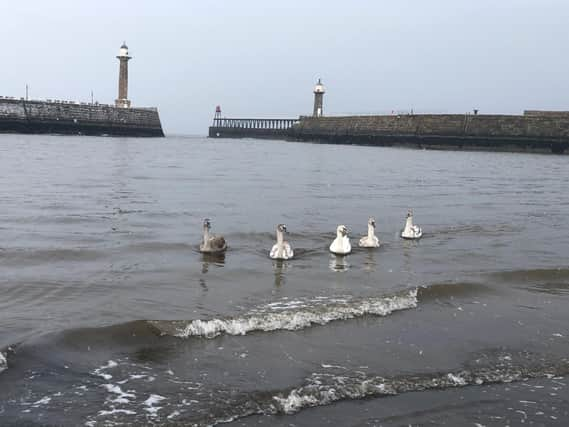RSPCA urges animal lovers to stop feeding young swans on Whitby beach


The group of young swans are a popular sight at the beach but there are fears for their safety as it's not a good spot for them to be long term.
RSPCA Inspector Claire Little says: “It is lovely that people are taking such an interest in these beautiful birds and trying to give them food - but they are at real risk of not learning how to cope by themselves.
Advertisement
Hide AdAdvertisement
Hide Ad"We’re very concerned for these swans, who are currently in danger of potentially being killed with kindness.
“We are urging the public not to feed or interact with these wild animals as they are losing their natural wariness of humans.
“Whitby beach is lovely, but it’s the wrong place for these vulnerable swans.
"The beach gets very busy and is popular with dog-walkers. One of the swans has already been attacked by a dog, so while the birds are still on the beach, we’d really like dogs to be kept on leads.
Advertisement
Hide AdAdvertisement
Hide Ad“While the swans continue to be fed by the public, there’s no incentive for them to move themselves to a safer, more appropriate location where they can relearn their natural behaviour and find their own food.
"Bread is not appropriate food for swans; instead, they should be foraging in lakes and streams for aquatic vegetation, molluscs and small fish, frogs and worms.
“We understand that it may feel hard not to feed them, but the kindest thing we can do for these gorgeous birds is to leave them alone, which will encourage them to move on.
"If we all work together, we can make sure all these swans have a safe, natural future.”
Advertisement
Hide AdAdvertisement
Hide AdThis group of swans are currently fit and well, but if you do have concerns for a wild animal, you can contact the RSPCA’s emergency line on 0300 1234 999.
To help the RSPCA continue rescuing, rehabilitating and rehoming animals in desperate need of care please visit our website or call our donation line on 0300 123 8181.
A message from the editor
Thank you for reading this story on our website. While I have your attention, I also have an important request to make of you.
In order for us to continue to provide high quality and trusted local news on this free-to-read site, I am asking you to also please purchase a copy of our newspaper.
Advertisement
Hide AdAdvertisement
Hide AdOur journalists are highly trained and our content is independently regulated by IPSO to some of the highest standards in the world.
The dramatic events of 2020 are having a major impact on many of our local valued advertisers and consequently the advertising that we receive.
We are now more reliant than ever on you helping us to provide you with news by buying a copy of our newspaper.
Thank you,
Jean MacQuarrie, Editor-in-Chief